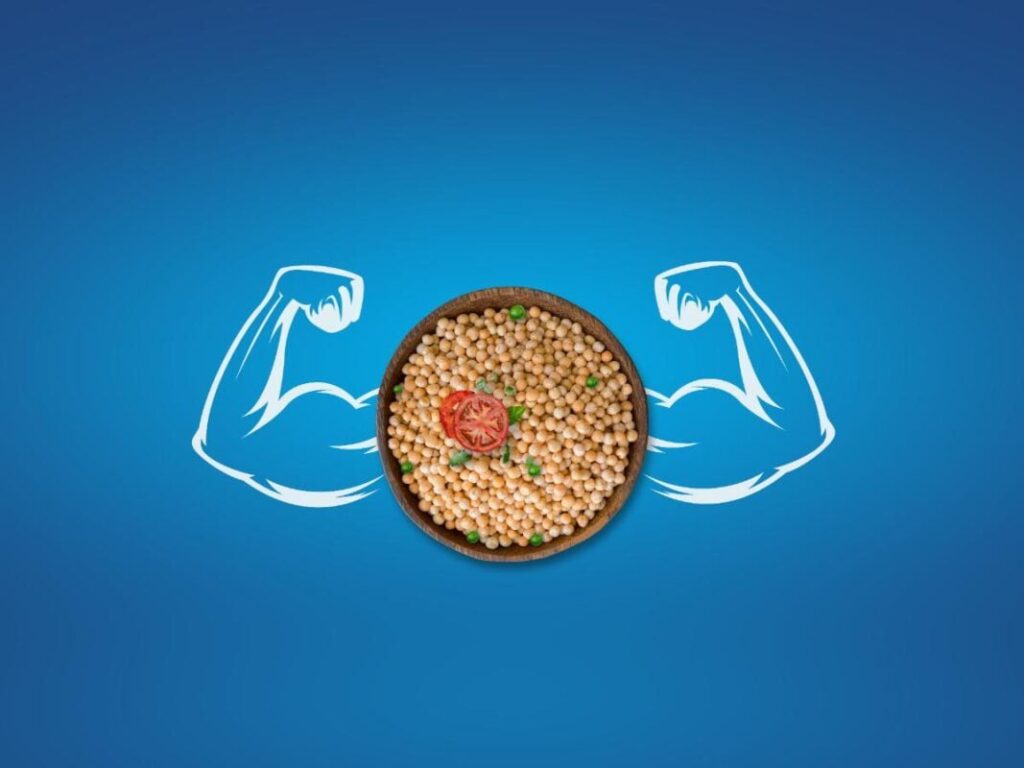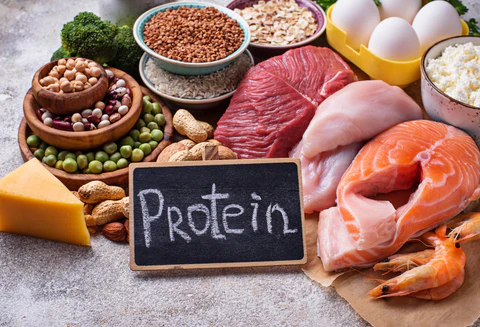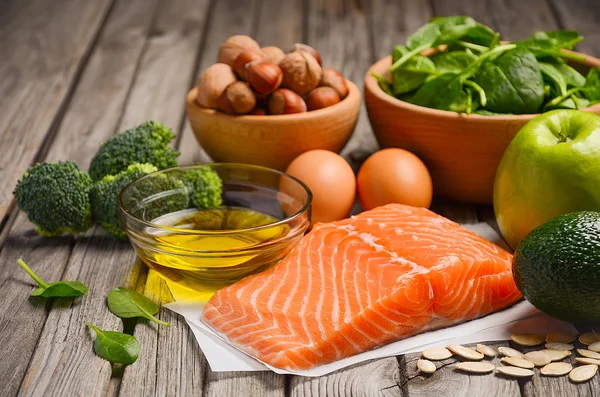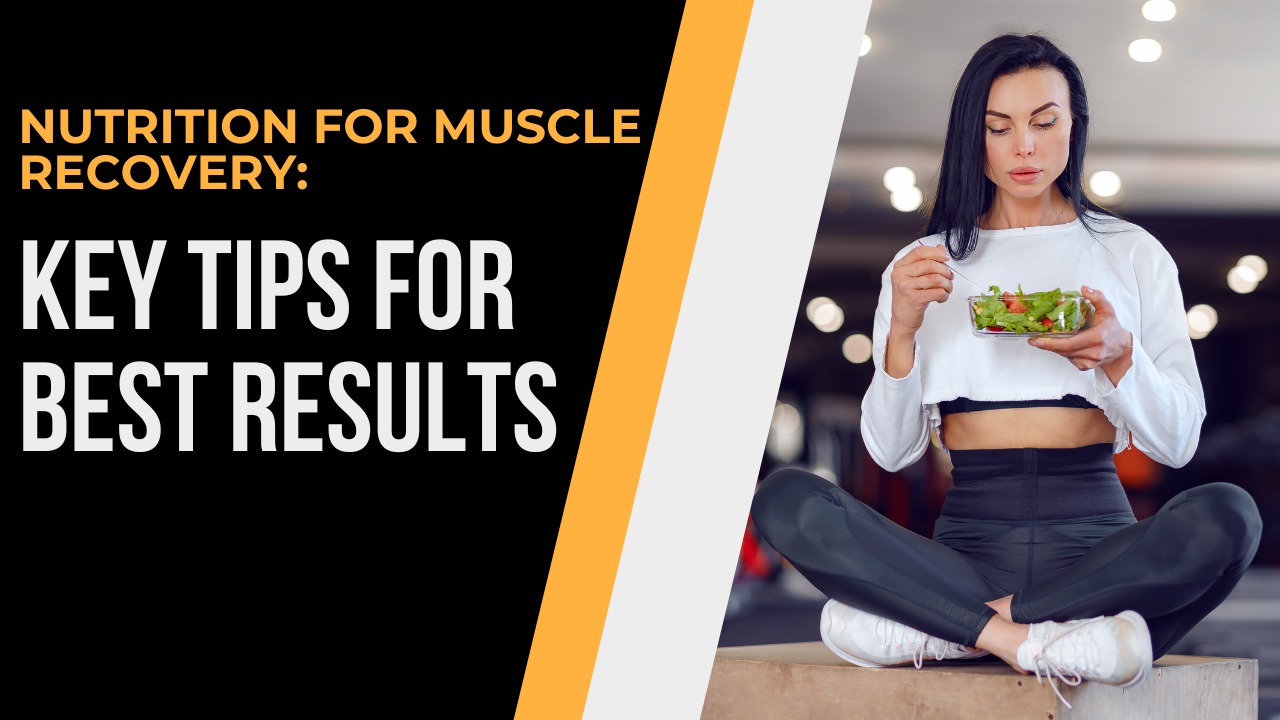Muscle recovery is essential for anyone involved in physical activity, from weekend warriors to professional athletes. After a tough workout, your muscles go through stress, tiny tears, and fatigue that require time and support to heal and grow stronger. Without proper recovery, you risk injury, fatigue, and stalled progress.
While rest and quality sleep are key parts of the recovery process, nutrition for muscle recovery plays an equally powerful role. Supplying your body with the right nutrients helps reduce inflammation, rebuild muscle fibers, and restore energy levels. Ignoring your post-workout nutrition can delay recovery and affect performance.
To optimize your results, focus on foods rich in protein, complex carbohydrates, and anti-inflammatory nutrients. Include lean meats, eggs, Greek yogurt, leafy greens, berries, and whole grains in your diet. Proper hydration and timing of meals also matter. A strategic approach to nutrition for muscle recovery can significantly boost your fitness gains and overall well-being.
The Science of Muscle Recovery

During exercise, particularly strength or resistance training, microscopic tears form in your muscle fibers. This damage is a natural part of building muscle, and recovery helps repair these fibers, making them thicker and stronger.
For this repair to happen effectively, the body needs the right nutrients and energy. Without proper fuel, the recovery process slows down, and muscle growth is limited. Ensuring the body has access to the necessary nutrients, like protein, vitamins, and minerals, speeds up recovery, allowing muscles to rebuild and become stronger over time.
Muscle recovery involves three key phases:
Glycogen Replenishment: During intense or prolonged exercise, your body primarily relies on glycogen stored in muscles for energy. After the workout, these glycogen levels are depleted and need to be restored to maintain performance in future sessions. Including complex carbohydrates like whole grains, fruits, and starchy vegetables in your nutrition for muscle recovery plan is vital for efficient glycogen replenishment.
Muscle Protein Synthesis: Following a workout, your body begins the process of muscle protein synthesis (MPS), repairing and strengthening muscle fibers. Consuming high-quality protein rich in essential amino acids—especially leucine—stimulates MPS effectively. Foods like lean meats, dairy, eggs, and legumes should be part of your nutrition for muscle recovery to ensure optimal muscle repair and growth.
Muscle Protein Synthesis: Following a workout, your body begins the process of muscle protein synthesis (MPS), repairing and strengthening muscle fibers. Consuming high-quality protein rich in essential amino acids—especially leucine—stimulates MPS effectively. Foods like lean meats, dairy, eggs, and legumes should be part of your nutrition for muscle recovery to ensure optimal muscle repair and growth.
Inflammation Reduction: Intense physical activity naturally leads to muscle inflammation, which can slow recovery if not addressed. Incorporating anti-inflammatory nutrients such as omega-3 fatty acids, vitamin C, and antioxidants into your nutrition for muscle recovery routine helps minimize soreness, reduce swelling, and promote faster healing. Sources include fatty fish, berries, leafy greens, and nuts.
Effective muscle recovery requires the right balance of macronutrients (carbohydrates, proteins, and fats), micronutrients (vitamins and minerals), hydration, and timing of nutrient intake.
The Role of Carbohydrates in Muscle Recovery
Carbohydrates are a vital yet often underestimated component of nutrition for muscle recovery. During exercise, especially high-intensity or endurance workouts, your muscles draw energy primarily from glycogen—stored carbohydrates in muscle tissue. As glycogen is depleted, your body begins to tire, and your performance declines. After exercise, it’s essential to restore these glycogen levels to maintain energy, support metabolic functions, and prepare your muscles for the next workout. Skipping carbohydrates in your recovery routine can delay replenishment, slow down recovery, and compromise your overall training progress.

Including carbohydrates in your post-workout meal helps speed up glycogen synthesis and ensures your muscles recover efficiently. Whole food sources like brown rice, quinoa, sweet potatoes, fruits, and whole grains are excellent choices because they provide sustained energy along with additional nutrients. When paired with protein, carbohydrates also help enhance muscle protein synthesis by triggering an insulin response that supports nutrient transport into muscle cells. This synergy maximizes the impact of your nutrition for muscle recovery, helping you rebuild stronger and faster. For anyone serious about their fitness journey, understanding the importance of carbs and incorporating them wisely after workouts can make a significant difference in performance, energy levels, and long-term muscle health.
Why Carbohydrates Are Crucial:
Restore Glycogen Levels: After high-intensity or extended workouts, muscle glycogen stores become depleted and must be replenished to maintain energy and performance. Carbohydrates play a crucial role in this process. Including carbohydrate-rich foods like brown rice, bananas, or sweet potatoes in your nutrition for muscle recovery plan helps restore glycogen levels efficiently and prepares your body for the next training session.
Improve Protein Synthesis: Carbohydrates not only replenish energy but also support muscle growth when consumed with protein. They trigger an insulin response that helps transport amino acids into muscle cells, boosting muscle protein synthesis. Pairing carbs with protein—like a chicken sandwich or yogurt with fruit—is a smart nutrition for muscle recovery strategy to accelerate muscle repair and promote lean muscle development.
Best Sources of Carbohydrates for Recovery:
Sweet Potatoes
Brown Rice
Oats
Quinoa
Bananas
Whole-Grain Bread
Berries
Beans and Lentils
The Importance of Protein in Muscle Recovery
Protein is crucial for muscle recovery because it supplies the amino acids needed to repair muscle fibers. After exercise, small tears occur in the muscles, and protein helps fix them, kickstarting the rebuilding process.
This process, called muscle protein synthesis, is vital for muscle growth and recovery. By providing the building blocks for new muscle tissue, protein helps the body recover more effectively, reducing soreness and promoting strength. Consuming enough protein after a workout is essential for supporting these processes and improving overall muscle health and growth.
Key Protein Recommendations for Recovery
Essential Amino Acids: Amino acids are the foundational components of protein, and among them, leucine is especially important for jumpstarting muscle protein synthesis. Including high-quality protein sources—such as eggs, whey, or chicken—in your nutrition for muscle recovery ensures your muscles receive all essential amino acids needed for effective repair and rebuilding after intense physical activity.
Protein Timing: Consuming protein within 30–60 minutes post-workout is believed to optimize muscle protein synthesis, a phase often called the anabolic window. While recent research debates its strict timing, early protein intake still supports quicker recovery. Integrating timely protein consumption into your nutrition for muscle recovery plan helps ensure muscles receive immediate nourishment after training.
Protein Quantity: For effective recovery, consuming 20–40 grams of protein after a workout is generally recommended, with the exact amount based on body size and workout intensity. This supports muscle repair and growth. Meeting these needs through your nutrition for muscle recovery—using foods like lean meats, protein shakes, or Greek yogurt—ensures your body can recover and rebuild efficiently.
Best Sources of Protein for Muscle Recovery:

Chicken Breast
Turkey
Fish (Salmon, Tuna)
Eggs
Greek Yogurt
Whey Protein
Tofu and Tempeh
Lentils and Chickpeas
Healthy Fats: Anti-Inflammatory Powerhouses
Healthy fats are an essential part of nutrition for muscle recovery, especially due to their role in reducing inflammation after intense workouts. When you exercise vigorously, your muscles may become inflamed, leading to soreness and slower recovery. Including sources of healthy fats—such as avocados, nuts, seeds, and olive oil—can support the healing process. Omega-3 fatty acids, found in fatty fish like salmon and plant sources like flaxseeds, are particularly effective in fighting inflammation. By incorporating these fats into your post-workout meals, you can ease muscle soreness, promote faster recovery, and improve overall performance over time.
Benefits of Healthy Fats for Recovery
Reduced Inflammation: Omega-3 fatty acids, found in fatty fish like salmon and plant sources such as flaxseeds and chia seeds, play a key role in lowering inflammation. By reducing muscle soreness and swelling, these healthy fats enhance recovery speed. Including omega-3-rich foods in your nutrition for muscle recovery can significantly improve how quickly your body bounces back after workouts.
Cell Membrane Integrity: Healthy fats are crucial for maintaining the structure and fluidity of cell membranes, which are essential for proper nutrient exchange and muscle function. Strong membranes help deliver recovery nutrients more effectively. By incorporating sources of unsaturated fats into your nutrition for muscle recovery, such as avocados, nuts, and olive oil, you support optimal cellular health and muscle repair.
Hormonal Support: Fats are vital for producing key hormones like testosterone and growth hormone, both of which are necessary for muscle growth and tissue repair. A diet that includes adequate healthy fats supports a strong hormonal balance. Ensuring fat intake is part of your nutrition for muscle recovery routine helps promote consistent muscle repair and long-term performance gains.
Best Sources of Healthy Fats
Salmon and Mackerel (Rich in Omega-3s)
Chia Seeds
Flaxseeds
Avocados
Olive Oil
Nuts (Almonds, Walnuts)
Nut Butters

The Role of Vitamins and Minerals in Recovery
Micronutrients like vitamins and minerals are essential for effective muscle recovery. Although they don’t directly provide energy, they play a key role in supporting the processes that repair muscles after exercise. These nutrients help reduce inflammation and oxidative stress, which can slow down healing.
By aiding in these recovery processes, micronutrients contribute to faster muscle repair and less discomfort. They ensure that the body’s systems work efficiently, promoting overall muscle health and improving recovery time. Including a variety of vitamins and minerals in your diet can significantly enhance your recovery after physical activity.
Key Vitamins and Minerals for Muscle Recovery:
Vitamin D: Vitamin D is essential for healthy muscle function and recovery. It supports calcium absorption, which is necessary for effective muscle contractions. Low vitamin D levels can lead to muscle weakness and slow recovery. Including fortified foods or safe sun exposure in your nutrition for muscle recovery plan helps maintain optimal levels for strength and repair.
Vitamin C: Vitamin C plays a key role in reducing oxidative stress caused by intense exercise. Its antioxidant properties help protect muscle cells and speed up recovery. Additionally, it aids in collagen production, vital for strong tendons and ligaments. Including citrus fruits and leafy greens in your nutrition for muscle recovery ensures better muscle repair and joint support.
Magnesium: Magnesium is crucial for muscle relaxation and preventing cramps after exercise. It also plays a role in cellular energy production, which supports muscle recovery and function. Foods like nuts, seeds, and leafy greens are excellent sources to include in your nutrition for muscle recovery for smoother post-workout recovery.
Calcium: Calcium is vital for proper muscle contraction and relaxation. It ensures muscles function efficiently during recovery and helps prevent post-exercise cramps. Dairy products, leafy greens, and fortified foods should be part of your nutrition for muscle recovery plan to maintain strong, well-functioning muscles and support overall recovery.
Potassium: Potassium helps maintain fluid balance and supports nerve signaling, both of which are critical for muscle function. It also helps prevent cramps and fatigue after intense activity. Bananas, sweet potatoes, and coconut water are excellent potassium sources to include in your nutrition for muscle recovery strategy for optimal hydration and muscle repair.
Best Sources of Vitamins and Minerals:
Leafy Greens (Spinach, Kale): High in magnesium, potassium, and vitamin C
Citrus Fruits: Packed with vitamin C
Eggs: Rich in vitamin D
Dairy Products: Excellent sources of calcium
Bananas and Sweet Potatoes: Great for potassium
Fortified Foods: Vitamin D-fortified milk or cereals
Hydration: The Unsung Hero of Recovery
Dehydration can slow down muscle recovery because the body needs enough water to work properly. Water helps carry nutrients to the muscles, keeps body temperature steady, and supports normal muscle movement. Without enough water, the body may struggle to repair muscles after exercise.
Staying well-hydrated helps keep blood flowing smoothly, which means muscles get the nutrients they need faster. This can lower the chances of cramps, tiredness, and delayed recovery. Drinking water before, during, and after physical activity supports better performance and faster healing, making it an important part of any fitness or recovery plan.

Tips for Optimal Muscle Recovery
Electrolyte Drinks: Following prolonged or high-intensity exercise, simply drinking water may not be enough to fully rehydrate your body. Sweat contains essential electrolytes—like sodium, potassium, and magnesium—that help regulate muscle contractions and fluid balance. Replenishing these with an electrolyte drink supports quicker recovery, reduces cramping, and improves energy levels. Integrating electrolyte-rich beverages into your nutrition for muscle recovery plan can greatly enhance muscle function and reduce post-workout fatigue, especially after long training sessions or workouts in hot conditions.
Coconut Water: Coconut water is a natural and effective alternative to commercial sports drinks, offering a rich supply of essential electrolytes like potassium, magnesium, and sodium. These minerals are vital for restoring muscle hydration and preventing cramps after intense workouts. As part of your nutrition for muscle recovery, coconut water helps rehydrate the body more efficiently, supports muscle function, and promotes faster recovery. Its low sugar content and natural composition make it a healthier choice for athletes seeking to restore electrolyte balance and reduce post-exercise fatigue without added artificial ingredients.
Sample Post-Workout Meal for Muscle Recovery
Here’s an example of a well-balanced post-workout meal that incorporates all the necessary nutrients for muscle recovery:
Grilled Chicken Breast: Grilled chicken breast is a lean, high-quality protein source that provides approximately 20–30 grams of protein per serving. It is rich in essential amino acids, especially leucine, which is key for muscle protein synthesis. Including grilled chicken in your nutrition for muscle recovery helps repair damaged muscle fibers and promotes lean muscle growth. It’s a versatile option that can be easily paired with complex carbs and healthy fats for a balanced recovery meal.
Quinoa or Brown Rice: Quinoa and brown rice are excellent complex carbohydrates that help replenish glycogen stores depleted during exercise. Quinoa also offers a complete protein profile, making it a bonus for recovery. Including these grains in your nutrition for muscle recovery ensures your body has the energy to rebuild muscles and prepare for your next workout. They also provide fiber and important nutrients like magnesium and B vitamins.
Mixed Greens with Olive Oil and Avocado: A salad made with mixed greens, olive oil, and avocado provides healthy fats, antioxidants, and anti-inflammatory compounds. Olive oil and avocado contain monounsaturated fats that support hormone production and cell membrane health. This combination is a powerful addition to your nutrition for muscle recovery, helping reduce inflammation, support joint health, and deliver essential vitamins like E and K for overall recovery support.
Banana: Bananas are a great source of fast-digesting carbohydrates and potassium, both essential for muscle recovery. Potassium aids in muscle contraction and fluid balance, helping to prevent post-exercise cramps. The natural sugars help replenish glycogen quickly. Including a banana in your nutrition for muscle recovery plan gives your body an immediate energy boost while supporting proper muscle function and hydration after a tough workout.
Greek Yogurt with Berries: Greek yogurt is packed with high-quality protein, including casein and whey, which aid muscle repair and reduce soreness. Berries add antioxidants like vitamin C that combat exercise-induced oxidative stress. Together, they make a powerful recovery snack. Incorporating Greek yogurt with berries into your nutrition for muscle recovery routine helps rebuild muscle tissue, reduce inflammation, and protect cells from damage caused by intense training.
Conclusion: Nutrition for Muscle Recovery

Muscle recovery is a crucial element of any effective fitness routine, and how you nourish your body after exercise significantly impacts the repair and growth process. Intense workouts cause micro-tears in muscle fibers, and the body needs the right fuel to rebuild them stronger. This is where nutrition for muscle recovery becomes essential.
A well-balanced post-workout meal should include carbohydrates to replenish glycogen stores, protein to stimulate muscle repair, and healthy fats to reduce inflammation. Additionally, vitamins and minerals like magnesium, calcium, and vitamin C support energy production, muscle contraction, and tissue healing. These nutrients work together to shorten recovery time and reduce muscle soreness.
Prioritizing nutrition for muscle recovery not only speeds up healing but also enhances strength, performance, and long-term results. Eating the right foods at the right time ensures your body has everything it needs to recover, rebuild, and perform better in future workouts. Fuel smart, recover strong!
FAQs
- What is muscle recovery, and why is it important ?
Muscle recovery is the process of repairing and rebuilding muscle fibers after exercise. It’s crucial for preventing injuries, reducing soreness, and improving overall performance. Proper recovery allows muscles to repair, grow stronger, and restore energy, helping you perform better in future workouts. - How can I speed up muscle recovery ?
To speed up muscle recovery, focus on a balanced post-workout nutrition plan with protein, carbohydrates, and healthy fats. Staying hydrated, getting quality sleep, and incorporating anti-inflammatory foods can also help reduce soreness and improve recovery time. - What should I eat after a workout for muscle recovery ?
After a workout, aim for a combination of high-quality protein (like chicken or yogurt) and complex carbohydrates (like sweet potatoes or brown rice) to replenish glycogen and support muscle repair. Adding healthy fats and anti-inflammatory foods can further support the recovery process. - How long does it take for muscles to recover after exercise ?
Recovery time varies depending on the intensity of the workout and individual factors. Generally, muscles may need 24–48 hours to recover fully after moderate exercise. Intense workouts or strength training may require more time for optimal recovery. - Does hydration affect muscle recovery ?
Yes, staying hydrated is essential for muscle recovery. Water helps transport nutrients to muscles, regulate body temperature, and prevent cramps. Dehydration can slow down recovery, so drinking water and electrolyte-rich drinks can enhance the recovery process.


